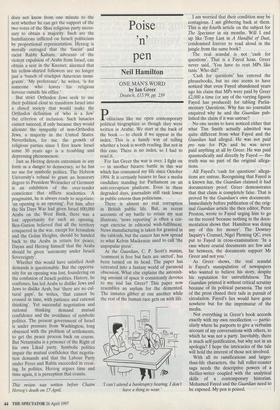Poise 'n' pen
Neil Hamilton
ONE MAN'S WORD by Ian Greer Deutsch, £15.99, pp. 239 Politicians like me open contemporary political biographies as though they were written in Arabic. We start at the back of the book — to check if we appear in the index. This is a handy way of telling whether a book is worth reading. But not in this case. There is no index, so I had to read it.
For Ian Greer the war is over. I fight on — in another bizarre battle in this war which has consumed my life since October 1994. It is certainly bizarre to face a media candidate standing for Parliament on an anti-corruption platform. Even in these degraded days, journalists still rank lower in public esteem than politicians.
There is almost no real corruption in British public life. But, as recent accounts of my battle to retain my seat illustrate, 'news reporting' is often a cor- rupt exercise in editorial wish-fulfilment. News manufacturing is taken for granted in the tabloids, but the cancer has now spread to what Kelvin Mackenzie used to call 'the unpopular press'.
At the Guardian, C. P. Scott's maxim, `comment is free but facts are sacred', has been turned on its head. The paper has retreated into a fantasy world of paranoid obsession. What else explains the astonish- ing amount of space it consistently devotes to me and Ian Greer? This paper now resembles an asylum for the demented. The inmates gibber at one another while the rest of the human race gets on with life.
'I can't attend a bankruptcy hearing. I don't have a thing to wear.' I am worried that their condition may be contagious. I am gibbering back at them. This is my fourth article on the subject for The Spectator in six months. Will I end up like Tony Last in A Handful of Dust, condemned forever to read aloud in the jungle from the same book?
The real scandal is not 'cash for questions'. That is a Fayed hoax. Greer never said, 'You have to rent MPs like taxis.' Who did?
`Cash for questions' has entered the phrasebooks, but no one seems to have noticed that even Fayed abandoned years ago his claim that MPs were paid by Greer £2,000 a time (or any of the varying figures Fayed has produced) for tabling Parlia- mentary Questions. Why has no journalist enquired why he and the Guardian pub- lished the claim if it was untrue?
No one seems to have noticed either that what Tim Smith actually admitted was quite different from what Fayed and the Guardian had alleged. He was not paid pro rata for PQs and he was never paid anything at all by Greer. He was paid spasmodically and directly by Fayed — the truth was no part of the original allega- tions.
All Fayed's 'cash for questions' allega- tions are untrue. Recognising that Fayed is a known liar, the Guardian claimed it had documentary proof. Greer demonstrates that that claim is completely false. That is proved by the Guardian's own documents. Immediately before publication of the orig- inal Guardian article the then editor, Peter Preston, wrote to Fayed urging him to go on the record 'because nothing in the docu- mentation shows that Hamilton was doing any of this for money'. The Downey Inquiry's Counsel, Nigel Pleming QC, even put to Fayed in cross-examination: 'In a case where crucial documents are few and far between, the documents support Mr Greer and not you.'
As Greer shows, the real scandal is Fayed's manipulation of newspapers who wanted to believe his story, despite his reputation for untruthfulness. The Guardian printed it without critical scrutiny because of its political paranoia. The rest of the press chased their tails in pursuit of circulation. Fayed's lies would have gone nowhere but for the imprimatur of the media.
Not everything in Greer's book accords exactly with my own recollection — partic- ularly where he purports to give a verbatim account of my conversations with others, to which he was not a party. Inevitably, there is much self-justification, but why not in an apologia? I hope the intricacies of the tale will hold the interest of those not involved.
With all its ramifications and larger- than-life characters, the full roller-coaster saga needs the descriptive powers of a thriller-writer coupled with the analytical skills of a contemporary historian. Mohamed Fayed and the Guardian need to be exposed. My pen is poised.


































































 Previous page
Previous page